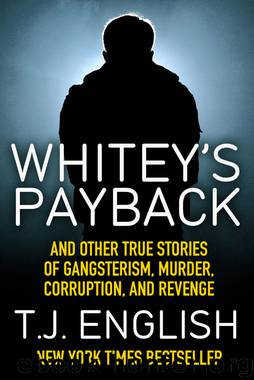Whitey's Payback by T. J. English

Author:T. J. English [English, T. J.]
Language: eng
Format: epub
Publisher: Head of Zeus
Published: 2013-06-25T16:00:00+00:00
Part 3
Narco Wars,
at Home and Abroad
And now a word about law enforcement.
In the course of my career as a writer, I have encountered or interviewed hundreds of patrol cops, detectives, federal agents, U.S. marshals, border patrol agents, district attorneys, federal and state prosecutors, and other representatives of the U.S. criminal justice system. Any relationship I might have with these people is shaped, of course, by the fact that I am a journalist and they are representatives of the system. To many in law enforcement, and some in the media, the journalist-cop relationship is and always will be an adversarial one.
For any cop or prosecutor to speak with me on the record, they must first have authorization from their department’s press office. If a cop has been authorized to speak with a reporter, it’s usually so that he or she can get their version of events out there. The cop and his bosses are interested in shaping the flow of information to the public, or giving the impression that they are on top of things even when they are not. Having been involved in writing about crime for as long as I have, I have cultivated a network of lawmen who will talk honestly with me—off the record. As a rule, cops or agents who are recently retired make the best sources, because they can speak more freely and with a higher degree of insight and objectivity. Since they were once part of the system, they know how things operate, and now that they are no longer beholden to the propaganda dictates of the job, they sometimes have a lot to get off their chests.
Generally, I like cops and get along well with them, though I sometimes have problems with particulars of the policies they are entrusted to carry out (as do some cops, by the way, though you are unlikely to hear them express it publicly).
Most people in law enforcement take their job seriously and conduct themselves with an adequate level of professionalism and respect. This varies in different jurisdictions depending on the competency of the training, quality of supervision, and the historical forces that have shaped the attitudes of a particular police force or prosecutorial agency.
Law enforcement can be a high intensity endeavor. Our culture tends to glorify the forces of law and order, so that some on the job crack under the scrutiny, or become drunk with the power and authority that has been bestowed upon them. In my time as a journalist, I’ve come across some who deviate from the norm of basic professionalism. They tend to fall into one of three categories:
Download
This site does not store any files on its server. We only index and link to content provided by other sites. Please contact the content providers to delete copyright contents if any and email us, we'll remove relevant links or contents immediately.
| Archaeology | Essays |
| Historical Geography | Historical Maps |
| Historiography | Reference |
| Study & Teaching |
Underground: A Human History of the Worlds Beneath Our Feet by Will Hunt(12098)
Sapiens by Yuval Noah Harari(5370)
Navigation and Map Reading by K Andrew(5158)
The Sympathizer by Viet Thanh Nguyen(4390)
Barron's AP Biology by Goldberg M.S. Deborah T(4150)
5 Steps to a 5 AP U.S. History, 2010-2011 Edition (5 Steps to a 5 on the Advanced Placement Examinations Series) by Armstrong Stephen(3734)
Three Women by Lisa Taddeo(3433)
Water by Ian Miller(3187)
The Comedians: Drunks, Thieves, Scoundrels, and the History of American Comedy by Nesteroff Kliph(3079)
Drugs Unlimited by Mike Power(2594)
A Short History of Drunkenness by Forsyth Mark(2297)
DarkMarket by Misha Glenny(2212)
And the Band Played On by Randy Shilts(2209)
The House of Government by Slezkine Yuri(2206)
The Library Book by Susan Orlean(2071)
Revived (Cat Patrick) by Cat Patrick(1992)
The Woman Who Smashed Codes by Jason Fagone(1973)
The Absolutely True Diary of a Part-Time Indian by Sherman Alexie(1913)
Birth by Tina Cassidy(1905)
